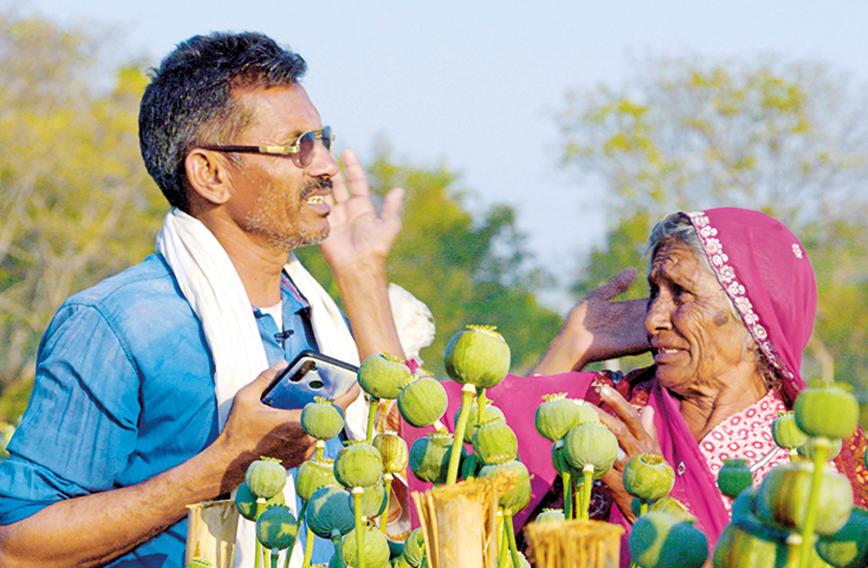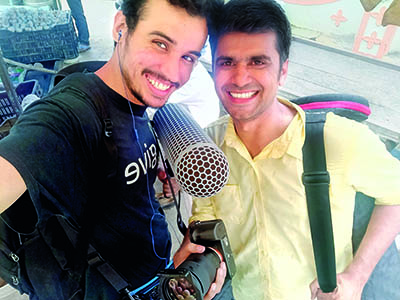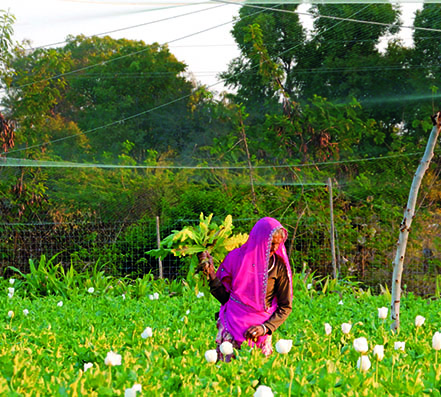
Vardibai, a poppy farmer, with her son, Mangilal, a schoolteacher-activist, in a still from I, Poppy
The agony of growing poppy
Saibal Chatterjee
Vivek Chaudhary’s 82-minute documentary, I, Poppy, dives deep into a world beset by corruption, coercion and a culture of fear. As the film unspools, it becomes clear why. What is just as apparent is that it could not have been easy realizing the film.
The film is dedicated to “the 75,000 poppy farming families that continue to be ruled by the greed and corruption of the Narcotics Bureau”. In highlighting their mounting struggles, it points to India’s severe agrarian crisis.
“This is the story of a lot of farmers across the country,” says Chaudhary, who is based in Mumbai. “With opium, there is the added angle of criminality and the pressures that
are in the system.” The film homes in on an elderly Dalit woman and her feisty son
who stand at two ends of the fight to sustain the trouble-prone trade.
I, Poppy won the top jury prize (Best International Feature Documentary) at the 2025 Hot Docs Festival in Toronto. It is about Vardibai, who labours to keep her farm up and running, and Mangilal, a schoolteacher-activist waging an unequal battle against corrupt officials and politicians who control opium cultivation.
In Vardibai’s village in eastern Rajasthan, as anywhere else where poppy is grown, the trade is at the mercy of officials who regulate the issuance of licences and politicians who formulate policies. The farmers are caught in a vicious cycle.
The huge bribes that the officials demand make the trade unviable and force the farmers to sell their produce illegally. Many end up in jail, where, charged with opium smuggling, they serve long sentences.
Getting to the core of the tale was fraught with danger. “We were mobbed by 30-40 upper caste farmers. They stopped us, tried to break our cameras and pull us out of our cars,” recalls Chaudhary.
The Pehlu Khan lynching had just happened and the film’s cameraperson was Mustaqeem Khan. The unit, therefore, had to tread with caution. “It was tough,” says Chaudhary.
The film unit tried to keep their purpose under wraps but a small newspaper item outed them. “In the first season of shooting itself, everybody knew who we were and where we were staying,” says Chaudhary.
 |
|
Director Vivek Chaudhary with his cameraman, Mustaqeem Khan |
The observational documentary shows Vardibai, a woman resigned to her fate but determined to keep going against all odds, toiling on the opium farm, sometimes joined by her elder grandson. Mangilal runs a concerted campaign to secure a better deal for the cultivators although it becomes increasingly clear to him and the audience that speaking the truth comes at a price.
Mangilal is both a Greek tragic hero and a Quixotic knight tilting at windmills. His is a classic David vs Goliath duel that isn’t likely to have a happy ending. His mother, in contrast, has memories of untouchability. She is at once submissive and endowed with steely resolve. She wants to make her way through life without letting matters turn any worse than they already are.
The generational divergence in their response to oppression constitutes the thematic core of I, Poppy. “I wanted to mirror what I was feeling when I was there with them,” says Chaudhary. “There were days when I was with the mother and days when I was with the son.” They represented two opposite poles within a family and, by extension, within the community of poppy farmers.
 |
|
The documentary is dedicated to 75,000 poppy farming families |
I, Poppy, says Chaudhary, is about “two people stuck with a system that overpowers them and dictates how they live, two people who love each other deeply but are at loggerheads because of what the system makes them do.”
As Chaudhary’s film sees it, while what the schoolteacher-activist was doing was necessary, the price that he would have to pay was probably avoidable. Says the director: “I would say to him, what you’re doing is great but you can’t do it at this cost.”
Chaudhary shot I, Poppy over four seasons. “We shot for a year prior to that,” he says, “because we had other stories in mind.” It was almost on the last day of the first year of shooting that Chaudhary serendipitously found Vardibai’s family.
Chaudhary’s family is from western Rajasthan. Somebody he knew put him in touch with a few upper caste villages in the eastern part of the state. “I was talking to three families there and wanted to focus on one of them. But the fault lines were not as clearly drawn because these families are very much within the system.”
That was not the case with the Dalit family. Vardibai had encountered untouchability and was passive on the face of it and yet driven by a fierce desire to better her lot. Mangilal, because of his Ambedkar politics, had an idealistic side that was missing among the upper caste farmers that Chaudhary initially followed.
“The day we were mobbed, when our memory card (thankfully not the camera) was destroyed and our car was stopped (but we, mercifully, weren’t dragged out), this guy who we met at the protest took us home and offered to let us stay for the night,” Chaudhary recalls.
He adds: “We walked into the house and saw the dynamic from the get-go. The presence of a camera, the presence of other people, did nothing to the mother. The polarized views we heard there gave us a sense of the world outside. It was out there for us to capture. We scrapped everything that we had shot earlier.”
The film, says Chaudhary, is meant “to make people think about their place in the world and about what they would do if they were in the situation (that Vardibai and Mangilal are in).” It frames a question and does not give an easy answer, he adds.
Where does I, Poppy go from here? “The challenge for an independent filmmaker,” says Chaudhary, “is just to get the film to the finish line after six or seven years of work. I am still processing the exhaustion and also the joy of showing it to people and hearing good things from them.”
He adds: “I now want the film to travel in the villages and help build solidarity among the farmers. They should come together and not think about short-term selfish gains.” I, Poppy had an impact at its world premiere in Toronto. Chaudhary is confident it will cut even deeper when people in India watch it.
Two Indian filmmakers were in the audience at the Hot Docs Festival screening, he reveals. “They said they could see it in a much deeper way because of the Dalit angle and just the risk of what Mangilal is doing and what the film is doing,” he says. ν
Comments
Currently there are no Comments. Be first to write a comment!





